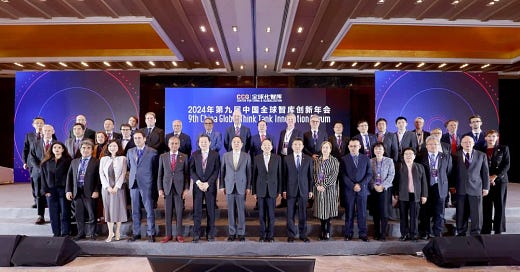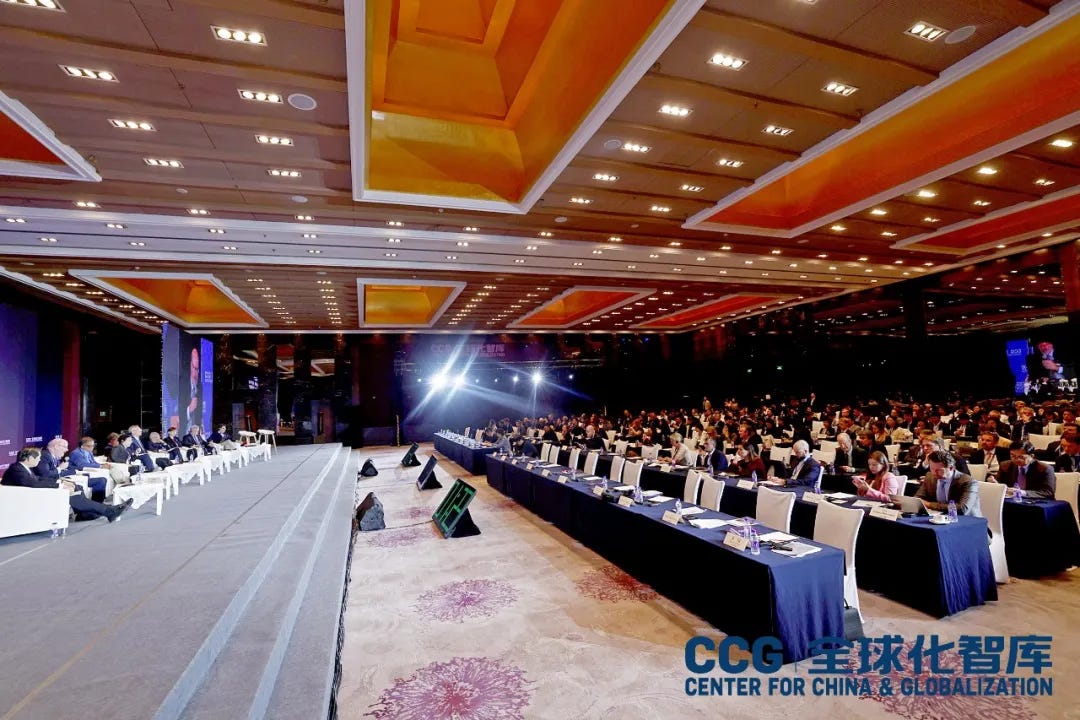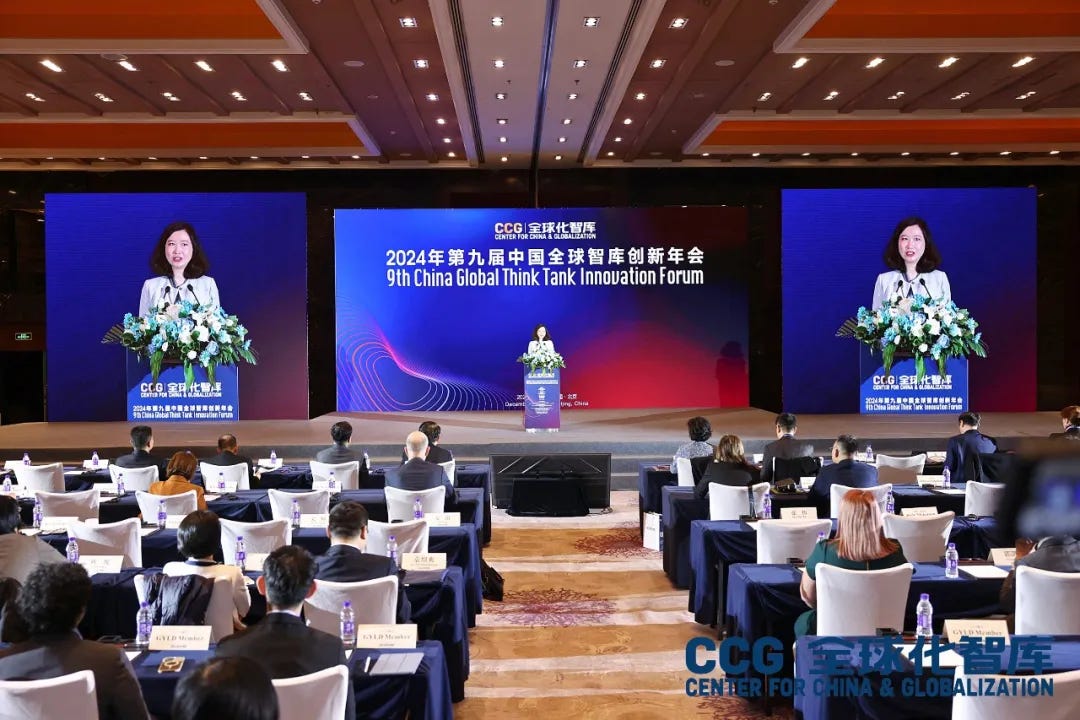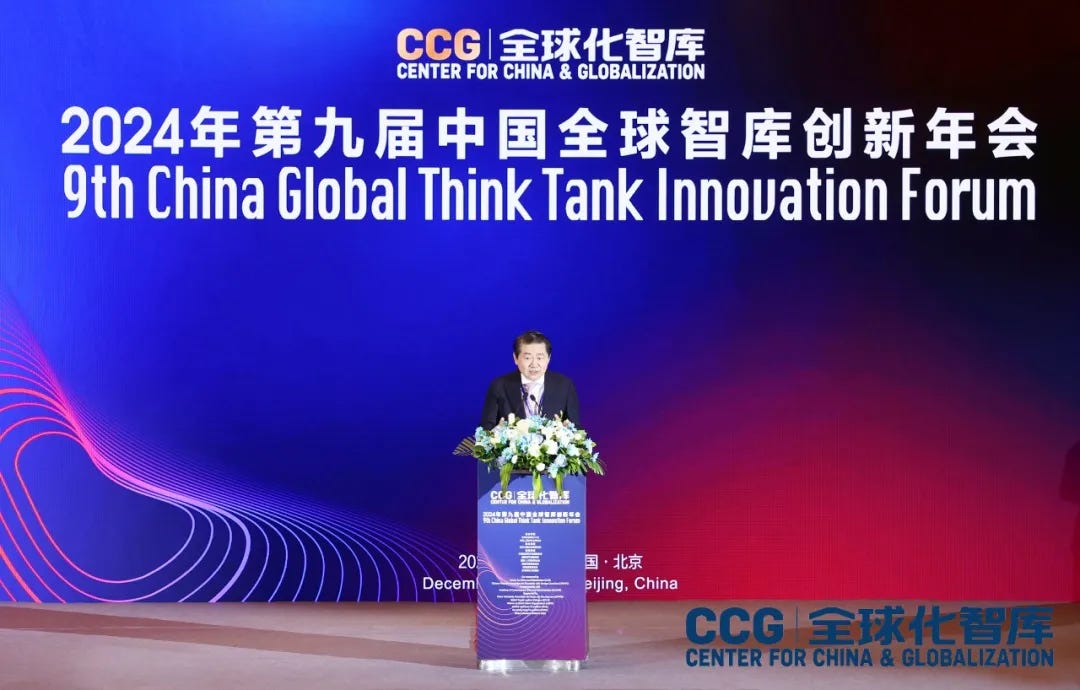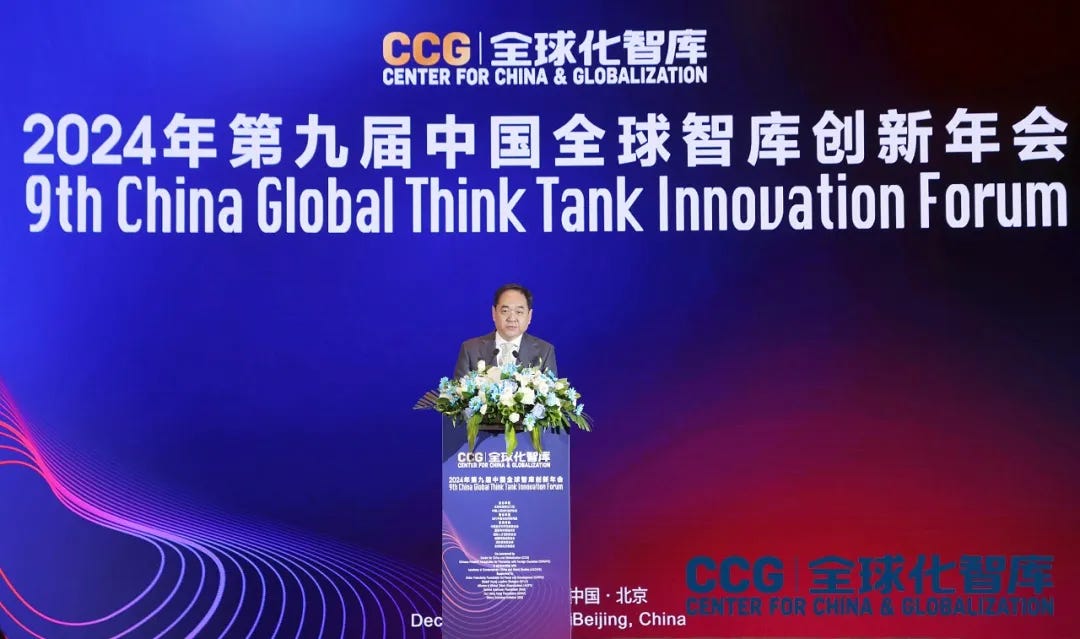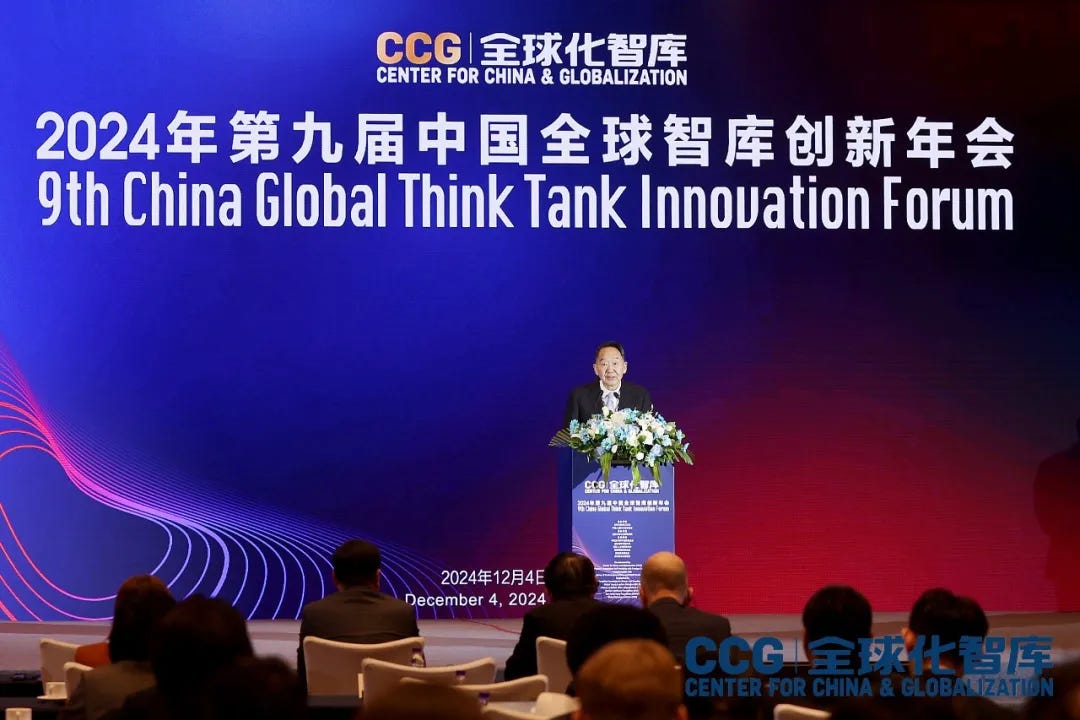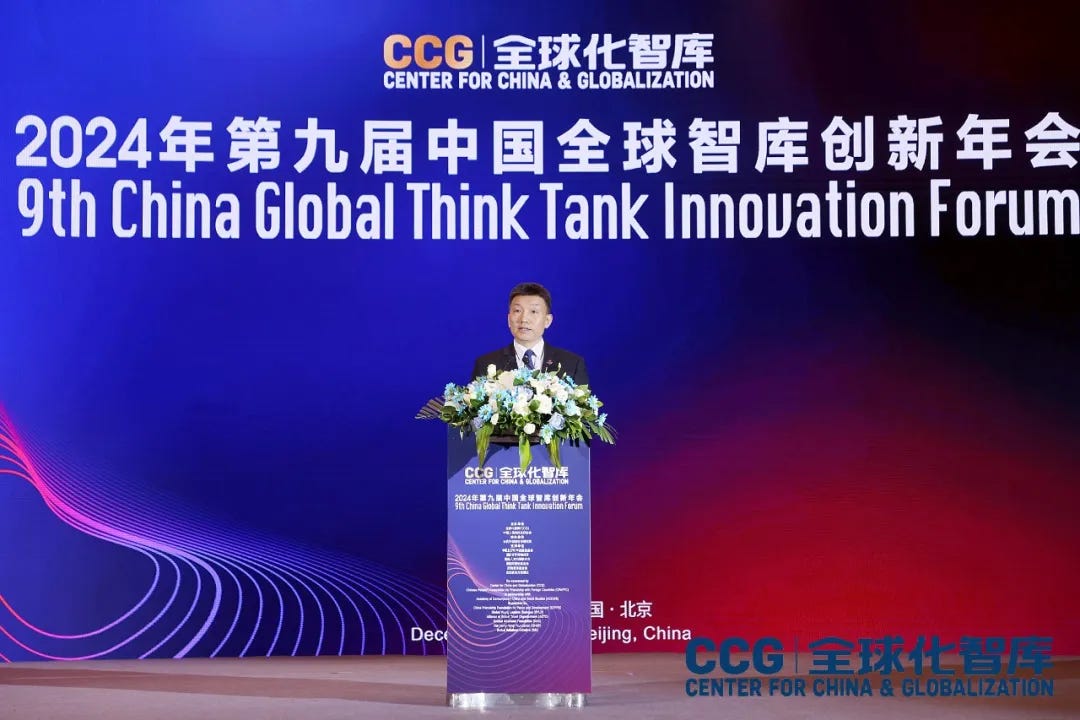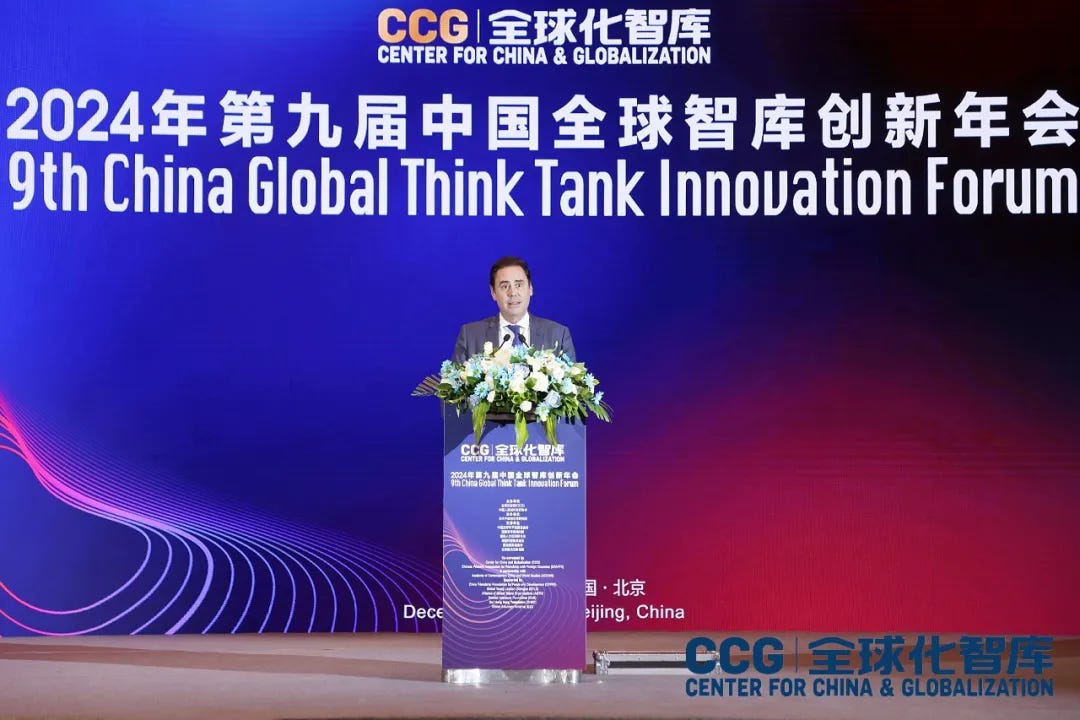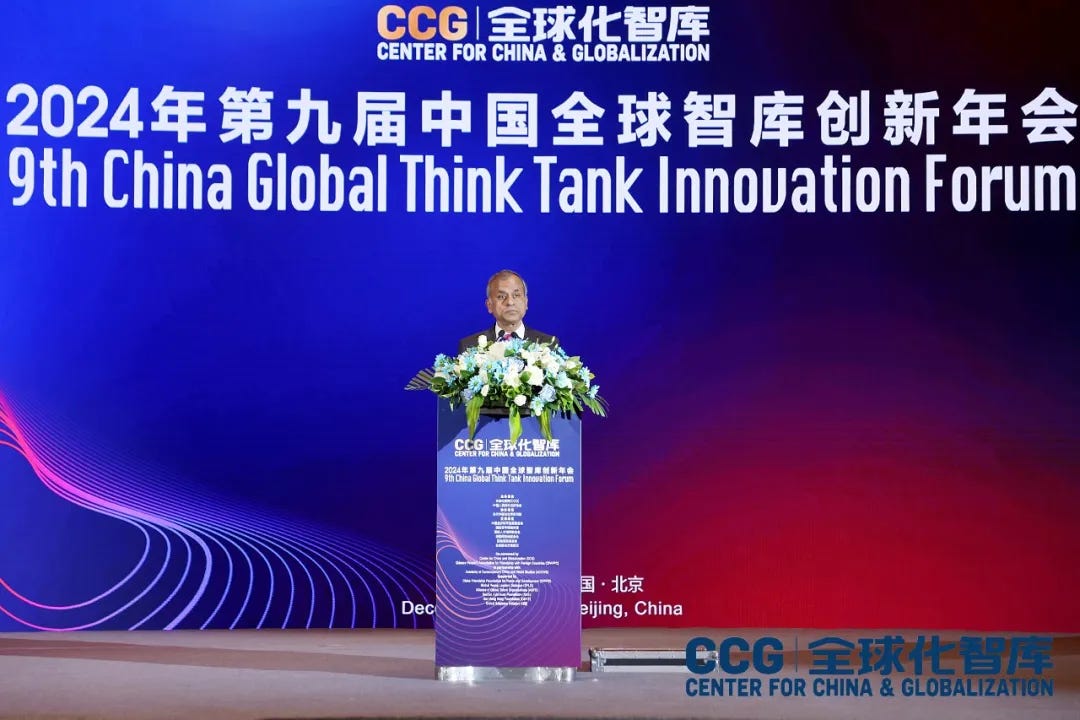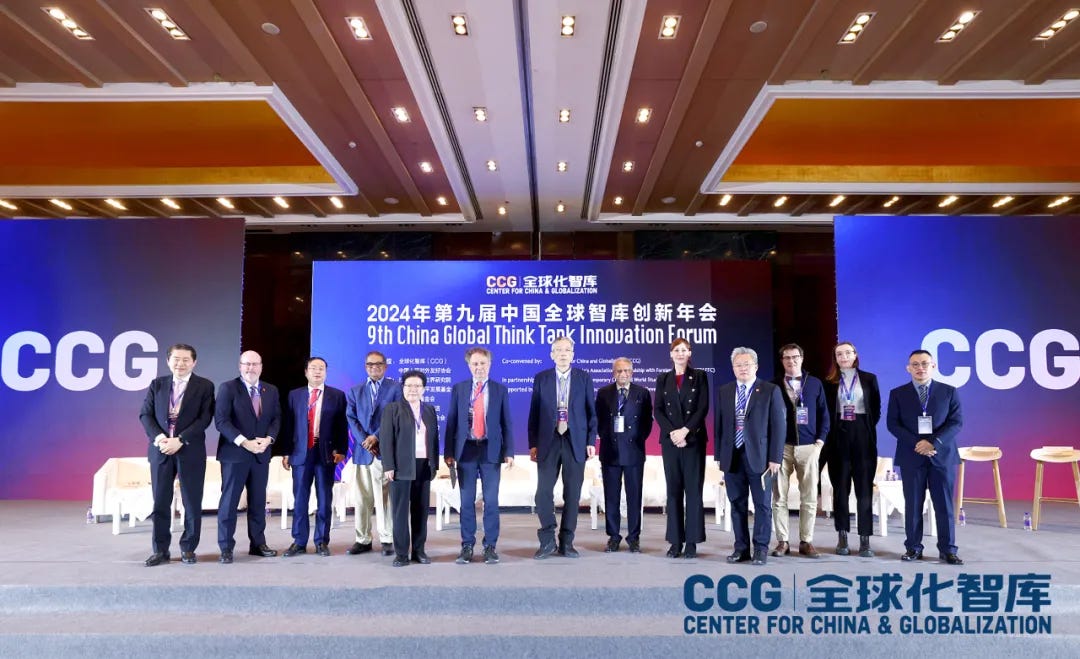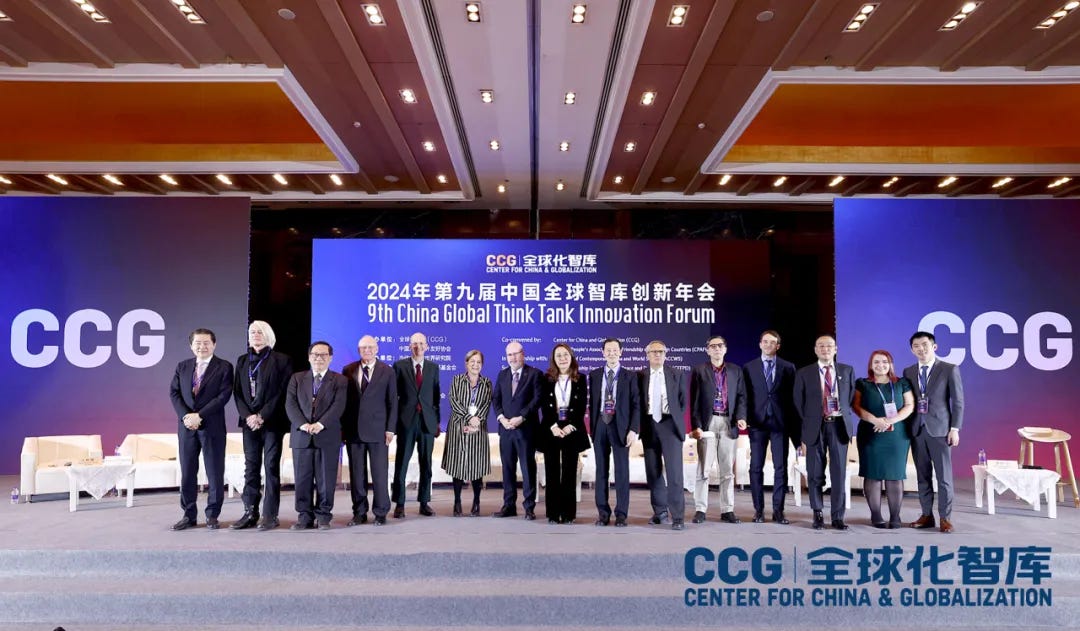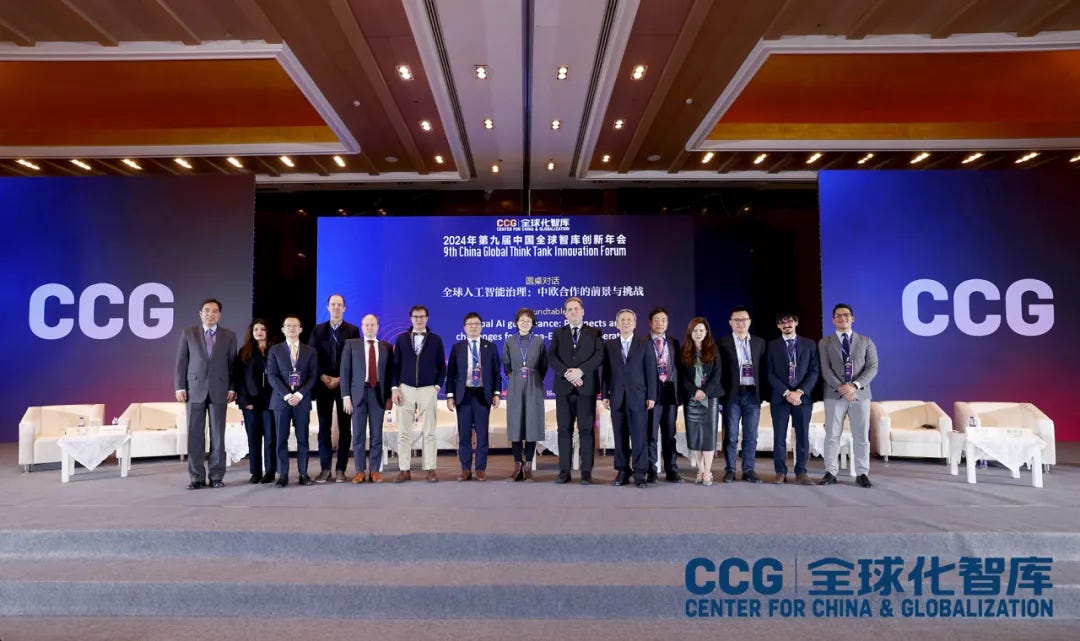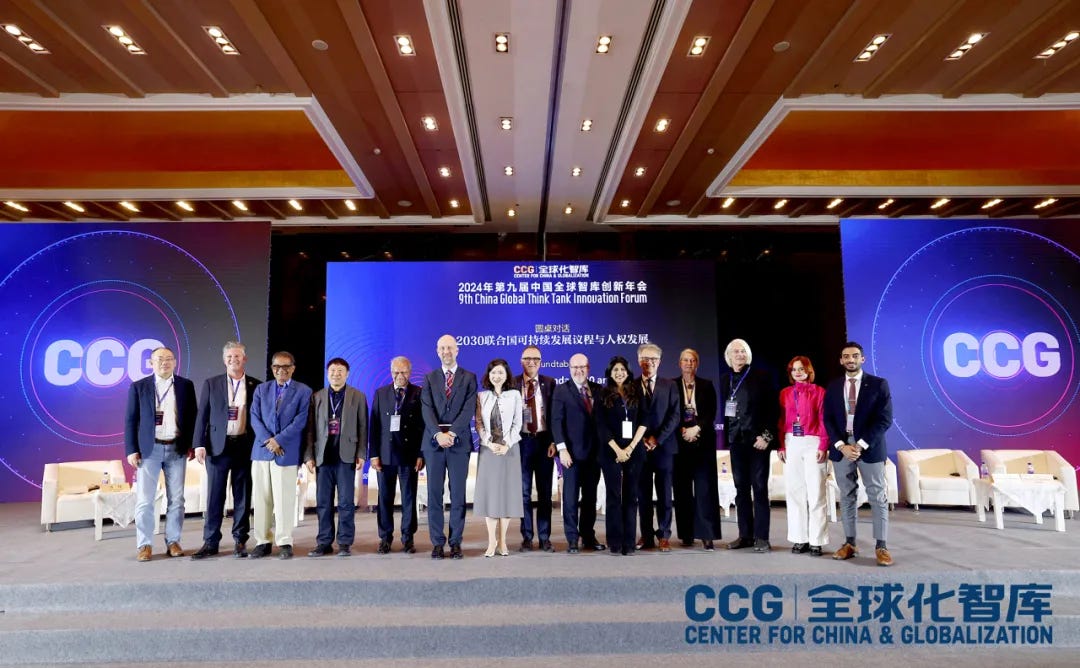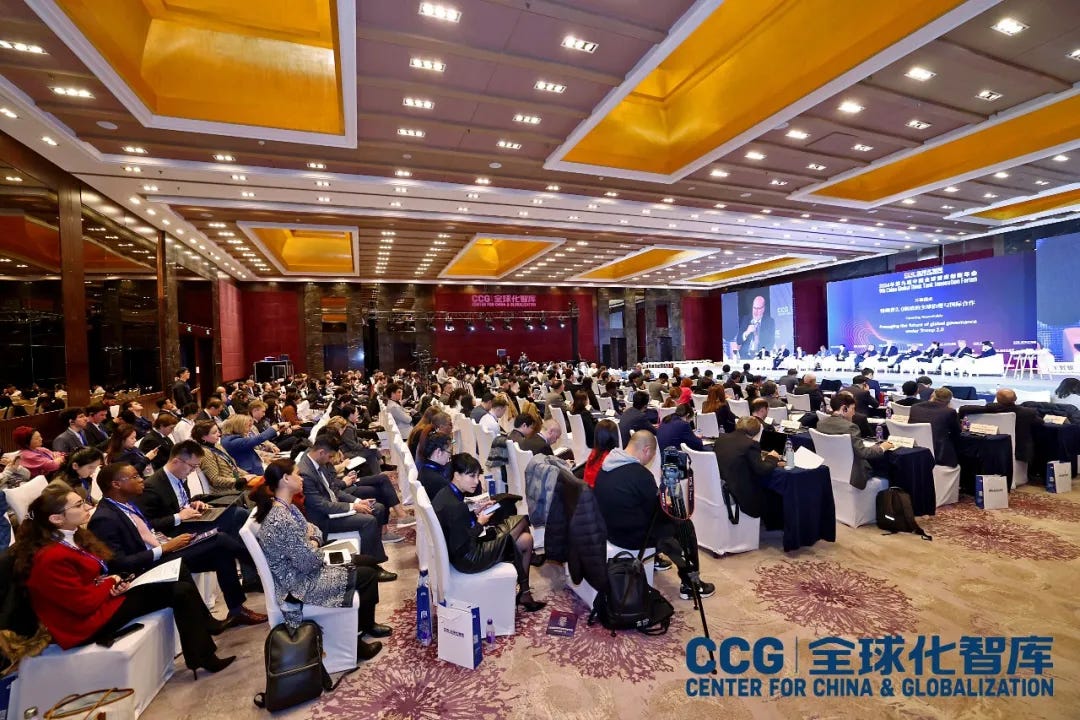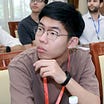CCG hosted the 9th China Global Think Tank Innovation Forum
Representatives from 50 countries and 90 think tanks gathered.
On December 4, 2024, the 9th China Global Think Tank Innovation Forum, organized by the Center for China and Globalization (CCG) and supported by the Chinese People's Association for Friendship with Foreign Countries (CPAFFC) and the Academy of Contemporary China and World Studies (ACCWS), was convened in Beijing.
As the most extensive international high-level think tank offline exchange event in China hosted by a non-governmental Chinese think tank in the past five years, this year's forum drew over 200 participants. Attendees included government officials, think tank and academic experts, representatives from international organizations, and business executives.
Additionally, nearly 30 outstanding young leaders from the Global Young Leaders Dialogue (GYLD) program participated, engaging in cross-national and cross-generational discussions with senior Chinese and foreign experts.
The video recording of the forum has been broadcast on the Chinese internet and remains available on both YouTube and the official WeChat blog of CCG.
The forum featured an opening ceremony followed by five panel discussions where participants engaged in in-depth discussions on key topics, including the global implications of Trump 2.0 for governance and international cooperation, post-election China-U.S. relations, the artificial intelligence governance globally, and the United Nations Sustainable Development Agenda.
At the opening ceremony, Mabel Lu Miao, Secretary-General of CCG and Founder of the GYLD project, extended a warm welcome to the attendees and emphasized this year's brand new mode of combining senior Chinese and foreign experts with international youth leaders.
In his opening speech, CCG President and former Counselor of the State Council, Henry Huiyao Wang, outlined the forum's agenda and called on all stakeholders to deepen mutual understanding and cooperation through dialogue to collectively foster a stable and inclusive global community.
Yang Wanming, President of the CPAFFC, stressed the importance of China-U.S. relations, calling on the two countries to follow the principles of mutual respect, peaceful coexistence, and win-win cooperation, and to avoid malignant competition and conflict.
Yang also emphasized that people-to-people friendship is the foundation of international relations and called for more nongovernmental exchanges and cooperation to contribute to building a community with a shared future for manknd.
Jiang Jianguo, Executive Vice President of the China Society for Human Rights Studies and former Director of the State Council Information Office, highlighted the profound impact of anti-globalization trends on global perceptions and daily life, particularly in exacerbating the China-U.S. tension.
He outlined four key areas where China should strengthen its position in its competition with the U.S. First, leveraging ideological tools to stabilize China-U.S. relations; Second, consolidating material strength to advance national rejuvenation; third, optimizing strategies of struggle (斗争) to address misunderstandings through cultural exchanges; fourth, building a community with a shared future for mankind to uphold international order and promote global peace and development.
Yu Tao, Deputy Director of the China Foreign Languages Publishing Administration, emphasized that the world is currently undergoing unprecedented changes, and global development is facing new challenges. He put forward three key thoughts: first, peaceful development should be the baseline for the international community; second, mutual benefit and reciprocity should be the foundation of global economic and trade relations; third, exchanges and mutual learning should be the driving force behind the progress of civilizations.
Jorge Toledo Albiñana, the EU Ambassador to China, described China-EU relations through the EU's framework of partnership, competition, and systemic rivalry, which he considered accurate.
As partners, he noted, the two sides have made progress on global challenges like climate change and biodiversity, but further advancements require greater financial contributions from China, which the EU regards as a middle-to-high-income country. On competition, Toledo emphasized that while competition in trade and investment is natural, persistent unfair practices and market barriers have created imbalances, hampering progress in trade negotiations. He also pointed to systemic rivalry regarding China's stance on the war in Ukraine, the transfer of dual-use materials from China, and the broader implications of such actions on global order and human rights.
Despite these challenges, Toledo expressed the EU's commitment to dialogue and cooperation with China. He stressed the importance of addressing mutual misunderstandings through sustained bilateral efforts and seizing opportunities for collaboration as the United States transitions to a new president.
Siddharth Chatterjee, the UN Resident Coordinator in China, highlighted the unprecedented challenges the world faces post-World War II, including the COVID-19 pandemic, economic downturns, climate change, and geopolitical conflicts. Climate change, in particular, poses shared risks to food and human security, necessitating global cooperation, with the UN’s 2030 Sustainable Development Goals (SDGs) providing a critical framework.
Chatterjee called for stronger multilateralism, urging collaboration among the UN's 193 member states, particularly major players like the U.S. and China, to overcome divisions and work toward shared progress. He outlined five key areas for global cooperation—quantum technology, AI, think tank collaboration, and sustainable and innovative development—while advocating for reforming international financial systems to better support developing countries and the SDGs. Praising China’s success in poverty alleviation, he suggested it as a model for global learning.
The opening roundtable, moderated by Henry Huiyao Wang, was centered on the theme "Presaging the Future of Global Governance under Trump 2.0".
Speakers, including
Amitav Acharya, Distinguished Professor, American University; Consultant, UNESCO
Mohamed Amersi, Founder and Chairman, Amersi Foundation
Chen Wenling, Academic Council Member, Center for China and Globalization (CCG); Chief Economist, China Center for International Economic Exchange (CCIEE)
Michele Geraci, Former Undersecretary of State, Italian Ministry of Economic Development
Suzannah Jessep, Chief Executive, Asia New Zealand Foundation
Jin Xin, Director of the Research Office and Director-General of the Institute of World Political Parties, International Department of the CPC Central Committee
Liu Shijin, Former Deputy President, China State Council's Development Research Center
Lu Ruquan, Director, CNPC's Economics and Technology Research Institute (ETRI)
Jeff Nankivell, President and CEO, Asia Pacific Foundation of Canada
Felix Valdivieso, Chairman, IE China Center, IE University
shared their insights on topics such as how Trump's trade policies will impact the broader global economic order, how existing global governance mechanisms can adapt to new global realities, and what role Global South countries can play in shaping future developments.
Two international guests from the GYLD project:
Harsen Roy Tampomuri, Indonesian President Office Advisor (Indonesia)
Magdalena Rakovec, Program Director, Young Bled Strategic Forum (Slovenia)
raised insightful questions to the panellists on several global topics, including cross-border payment systems and the potential for China-U.S. cooperation.
The second panel, titled "Trump Trumps: What's Next for US-China Relations?", was moderated by Henry Huiyao Wang.
Speakers, including
David Blair, Former Professor and Chair of the Economics Department, the Eisenhower School of National Defense University
Laurence Brahm, Writer, Film Director, Producer, Shambhala Studio
Giorgio Cuscito, Editorial Board Member and China and Indo-Pacific Coordinator, Limes
Victor Gao, Vice President, CCG
He Weiwen, Senior fellow, CCG; Former Commercial Counsellor, Chinese Embassy in New York and San Francisco
James Zhongzi Lee, Founder, Lee World G9
Lu Xiang, Non-Resident Senior Fellow, CCG; Director of Research Department, Chinese Academy of Social Sciences (CASS)
Jeff Nankivell, President and CEO, Asia Pacific Foundation of Canada
Dede Nickerson, Strategic Advisor/Producer, DLN Media
Emanuel Yi Pastreich, Director, The Asia Institute
Alejandro Reyes, Scholar-in-Residence, Asia Society Hong Kong Center
Sun Jisheng, Vice President, China Foreign Affairs University (CFAU)
concentrated on several pressing issues, including the likelihood of a full-scale trade war between the U.S. and China, potential advancements in people-to-people exchanges, and collaborative efforts on global challenges such as climate change and global health. Each expert offered their unique insights on these critical topics.
Two international youth leaders,
Victor Kwok, Assistant Research Director and Head of Education & Youth, Our Hong Kong Foundation Limited (Hong Kong, China)
Avery Jade Prewitt, Master Student of Chinese Politics, Tsinghua University (America)
posed important questions to the attending experts regarding the advancement of Sino-American cultural exchange, sparking an in-depth discussion on how to promote cultural exchanges between the two countries amid the complexities of the current international environment.
The third panel, themed "Global Al governance: Prospects and Challenges for China-Europe Cooperation - In Collaboration with the Global Solutions Initiative," was moderated by Mike Liu, Vice President and Senior Fellow of CCG.
At this session,
Yang Xuemei, Deputy Director General, China Science and Technology Exchange Center (CSTEC)
Bertrand Lortholary, Ambassador of France to China
delivered special remarks.
Speakers, including
Sherine Chen, Business Partner and President of International Department, Airdoc
Gu Dengchen, Director, International Policy Research Center, Ali Research
Marc Horn, President of Merck China
Andreas Hube, Vice Chairman, China-Brücke e.V.; former Global Vice President of SAP
Thorsten Jelinek, Research Fellow, Centre for Digital Governance, The Hertie School in Berlin
Tony Yong Jin, Executive Vice-President of Huawei in Europe
Steven Gang Li, Vice Dean and Chief Analyst, Tencent Research Institute
Vidisha Mishra, Director, Global Outreach & Policy, Global Solutions Initiative Foundation
Sun Yongfu, Senior Fellow, CCG; former Director of the European Affairs of the Ministry of Commerce (MOFCOM)
Felix Valdivieso, Chair, IE China Center, IE University
Wang Yiwei, Non-resident Senior Fellow, CCG; Jean Monnet Chair Professor & Director at the Center for European Studies, Renmin University of China
engaged in in-depth and heated discussions on several aspects, including the impact of Trump 2.0 on global artificial intelligence governance, how technological innovation in China and Europe can create synergies for the business community, and the development of specific metrics to track the effects of artificial intelligence on global equity and the widening digital divide.
Two GYLD representatives,
Guido Alberto Casanova, Junior Research Fellow, Italian Institute for International Political Studies (ISPI) (Italy)
Cerrato Lagos Heber Isaac, Master Student of Electrical Engineering, Northwestern Polytechnical University (Honduras)
engaged in discussions with experts and scholars at the event, focusing on topics related to China-EU AI governance cooperation and how the AI Act would impact European AI startups.
The fourth panel, themed "UN SDGs Agenda 2030 and Human Rights Development", was moderated by Mabel Lu Miao.
Speakers, including
Amitav Acharya, Distinguished Professor, American University; Consultant, UNESCO
Mohamed Amersi, Founder and Chairman, Amersi Foundation
Laurence Brahm, Writer, Film Director, Producer, Shambhala Studio
Vebjørn Dysvik, Ambassador of Norway to China
Bethan Greener, Professor of International Relations, Massey University
Berthold Kuhn, Professor, Freie Universität Berlin
Li Huailiang, Dean, Institute for a Community with a Shared Future, Communication University of China (CUC)
David Morris, Vice-Chair of the United Nations Sustainable Business Network for Asia Pacific; Founder and President of 1EarthVillage
Jeff Nankivell, President and CEO, Asia Pacific Foundation of Canada
Sambratha Shetty, Chief Operating Officer, The Synergia Foundation
Balthasar Staehelin, Personal Envoy of the President to China & Head of Regional Delegation for East Asia, International Committee of the Red Cross (ICRC)
Zhang Wei, Professor, Co-Director, the Institute for Human Rights, China University of Political Science and Law
shared their insights and experiences, proposing concrete solutions to global challenges from diverse perspectives and emphasizing the critical role of different countries in fostering cooperation and dialogue.
Two GYLD memebers,
Neli Akhobadze, History Researcher, Caucasian Association of China Studies Islam (Georgia)
Islam Alhalawany, Business and Policy Consultant; Master Student, Peking University (Egypt)
posed thought-provoking questions to the attendees regarding the impact of the Sustainable Development Agenda on the Global South and developing countries. They also emphasized the importance of inclusive policies and mechanisms to amplify the voices of people from all nations in global governance, urging the international community to pay greater attention to the needs and aspirations of developing countries.
This year's forum especially organized a panel dedicated to Middle Eastern issues moderated by Henry Huiyao Wang.
Experts, scholars, and diplomats attending the forum included
Zoon Ahmed, Research Fellow, CCG
Hussam Al Husseini, Ambassador of Jordan to China
Jasem Ibrahem Alnajem, Ambassador of Kuwait to China
Altay Ceylanoğlu, Counsellor of Turkish Embassy
Mohamed Amersi, Founder and Chairman, the Amersi Foundation
Abdelkader El Ansari, Ambassador of Morocco to China
Abolfazl Olamaei Far, Deputy Head of Mission, Embassy of Iran in China
Reza Pirpiran, Counsellor, Embassy of Iran in China
Milia Jabbour, Ambassador of Lebanon to China
Niu Xinchun, Executive Dean, Chinese Research Institute of Arab States, Ningxia University
Jeff Nankivell, President and CEO, Asia Pacific Foundation of Canada
Giorgio Cuscito, Editorial Board Member and China and Indo-Pacific Coordinator, Limes
Vidisha Mishra, Director, Global Outreach & Policy, Global Solutions Initiative Foundation
Felix Valdivieso, Chair, IE China Center, IE University
Berthold Kuhn, Professor, Freie Universität Berlin
Michele Geraci, Former Undersecretary of State, Ministry of Economic Development, Republic of Italy
Ole Spies, Deputy Director of Strategic Development at the Global Solutions Initiative
Victor Gao, Vice President, CCG
Veronica Liu, Research Fellow, CCG
The forum attracted representatives from nearly 90 institutions worldwide from around 50 countries, including the United States, the United Kingdom, Italy, New Zealand, Canada, Spain, India, Indonesia, France, Germany, Honduras, Norway, Georgia, Egypt, Jordan, Kuwait, Turkey, Morocco, Iran, Lebanon, Finland, Pakistan, Belgium, South Korea, Singapore, Switzerland, Ukraine, Cuba, Botswana, the Netherlands, Romania, Slovenia, and Azerbaijan.


